


Winning starts with what you know
The new version 18 offers completely new possibilities for chess training and analysis: playing style analysis, search for strategic themes, access to 6 billion Lichess games, player preparation by matching Lichess games, download Chess.com games with built-in API, built-in cloud engine and much more.
For those of you who, due to time constraints, principle or religious conviction, are unable to read protracted prose on the Internet, here is a summary of the two documents that we have received in support of the legendary chess champion Robert James "Bobby" Fischer. The full texts are given lower down on the page, and the links in the summaries takes you straight to each of them.
The Status Report by Einar S. Einarsson of the Icelandic RJF Committee complains that Fischer has been held for almost six months in jail, and that a month has now passed since he was granted a residence visa in Iceland. Still no tangible progress has been made, the US Embassy in Reykjavik has still not given any formal answers on the matter. The Japanese Authorities, too, are buckling under pressure from the US. When Fischer's assistant asked how long they intended to hold him, a high-ranking official replied, "We can keep him as long as we like. We can eat him if we choose to." Bobby is taking this harsh and hostile treatment admirably well, but he is getting physically exhausted by this very lengthy proceeding over a passport. He suffers from frequent headaches and dizziness.
"Six months in a Japanese prison over a passport" is an article by Guðmundur G. Thórarinsson, a former Icelandic Parliamentarian, former president of the Icelandic Chess Federation and chief organizer of the Match of the Century between Bobby Fischer and Boris Spassky in 1972. He describes Fischer's situation: the detainee is allowed to go outdoors for 45 minutes a day, five days a week. He suffers from chronic and worsening headaches and dizzy spells. "For twelve years, this lonely genius has been exiled from his homeland. He has sat in jail for six months because his passport is invalid." Thórarinsson reminds us that Fischer's crime was that he played chess in Yugoslavia in violation of the economic sanctions then in force. In his autobiography Bill Clinton says that the Americans passed this regulation knowing that numerous parties were selling weapons to the Balkan nations, but that no charges were filed in those cases because of the great shortage of weapons in the region. Neither were artists indicted when they worked there. Thórarinsson writes: "The only person in the world to have been indicted for a violation of this regulation – a regulation that has long since ceased to be in force, and a violation committed in a country that no longer exists – is Robert James Fischer. This case is an example of a barbarous violation of human rights."
Reykjavík, 15 January 2005
The situation in the Bobby Fischer affair against the US and Japanese Authorities seems to be a stalemate, at least for the time being. Bobby has now been held in detention in Ushiku, the immigration lock-up in Japan, for almost six months. A month has passed since the former world champion was granted a residence visa in Iceland without tangible progress.
The US Embassy in Reykjavik has still not bothered to answer formal questions about the matter from the RJF Committee, neither has it given any explanation or information asked for in an open letter to the US Ambassador Gadsden. Although the Japanese Justice Minister Chieko Nohno mumbled yes-yes some three weeks ago and promised to consider Bobby's handwritten plea to the Japanese authorities from his detention cell to be allowed to go to Iceland, nothing has happened.
"I also agree to withdraw my lawsuits pending at the Tokyo District Court once the destination of my deportation order is changed to Iceland," Bobby wrote. "Generally speaking, Nohno said, the destination of his deportation will be the United States but we will consider his wishes and whether he has a country willing to accept him as we decide where to deport him". The Japanese Authorities are clearly drawing their legs under pressure from the US.
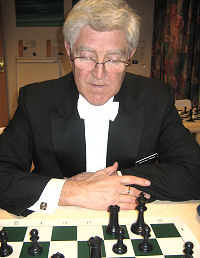 My Life, where he describes how the US Government itself violated the economic sanctions then in force in former Yugoslavia, (second par. page 667) which reads as follows.:
My Life, where he describes how the US Government itself violated the economic sanctions then in force in former Yugoslavia, (second par. page 667) which reads as follows.:
"Because we knew Bosnia's survival was at stake, we had not tightly enforced the arms embargo. As a result, both the Croatians and the Bosnians were able to get some arms, which helped them survive. We had also authorized a private company to use retired U.S. military personnel to improve and train the Croatian army"
(Furthermore the US involvement in the shipping of arms to Bosnia has earlier been made public in the media, for example in a BBC-television documentary.)
Einar S. Einarsson
Secretary of the RJF Committee – Iceland
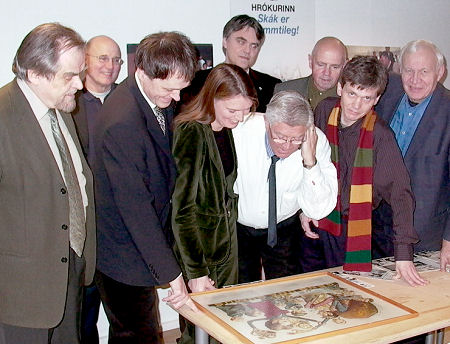
The RJF Committee, with M. Skúlason; G.Thorarinsson; H. Olafsson, Lilja Gretarsdottir, G. Sverrisson, S. Palsson, I. Asmundsson; H. Jökulsson; E. Einarsson
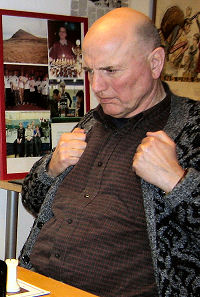
Six months in a Japanese prison over a passport
By Guðmundur G. Thórarinsson
By now Bobby Fischer has sat in jail in Japan for six months over an invalid passport. He is allowed to go outdoors for 45 minutes a day, five days a week. He suffers from chronic and worsening headaches and dizzy spells. It must certainly represent a dubious honor for the Japanese legal system if its behavior results in permanent damage to the chess master’s health. When Fischer’s attorney approached the Japanese bureaucracy asking for an answer to the question of how long they intend to hold him there, the official replied, “We can keep him as long as we like. We can eat him if we choose to.”
For twelve years, this lonely genius has been exiled from his homeland, bereft of friends and family. And in a case that has few, if any, parallels, he has sat in jail for six months because his passport is invalid.
His crime is that he played chess in Yugoslavia in violation of the economic sanctions then in force. It has now come to light that the only person in the world to have been indicted for a violation of this regulation – a regulation that has long since ceased to be in force, and a violation committed in a country that no longer exists – is Robert James Fischer.
Former US President Bill Clinton says, in his newly published autobiography, that the Americans passed this regulation knowing that numerous parties were selling weapons to the Balkan nations but that no charges were filed in those cases because of the great shortage of weapons in the region. Neither were artists indicted when they worked there.
But the world champion played chess in Yugoslavia, with the result that a warrant for his arrest has been issued in every legal precinct in the United States. The case is so serious in the eyes of the Americans that there is no statute of limitations on the crime. The punishment is a ten-year prison sentence.
Bobby Fischer had his passport renewed in 1997; therefore, it had not expired. The United States sent e-mails to a host of countries, informing them that Fischer’s passport had been revoked, but they conveniently forgot to inform Fischer himself. In God’s own country, that haven of individual rights, this detail was forgotten. That fact nullifies the revocation of the passport according to American law because Fischer had the right of protest.
The international chess community must certainly vilify the Japanese and criticize them no less than it does the Americans. This case is an example of a barbarous violation of human rights.
Davíð Oddsson’s handling of Fischer’s case has enhanced his image in the eyes of many people all over the world. Wouldn’t it be right to issue Fischer an Icelandic passport of the type that foreign citizens are able to obtain? Were this accomplished, it would hardly be possible to hold the man in prison on the premise that his passport is invalid.
Fischer has expressed an interest in playing chess with Icelandic young people and “Fischer chess” with Icelandic grand masters.
Would anyone care to hazard a guess as to what position posterity will take on the United States and Japan’s behavior in Fischer’s case?
Guðmundur G. Thórarinsson writes about Bobby Fischer’s affairs. The author is a former Member of the Icelandic Parliament and the former president of the Icelandic Chess Federation. In 1972 Mr. Thórarinsson was the chief organizer of the Match of the Century between Bobby Fischer and Boris Spassky.
Translated by Anna Benass
|
|
 RJF Committee mobilizes pro-Fischer forces RJF Committee mobilizes pro-Fischer forces18.12.2004 While Bobby Fischer remains incarcerated in a Japanese prison a special committee in Iceland is moving to get him free and find him a home on the North-Atlantic island country. Iceland's foreign minister and a prominent political scientist have spoken out. Here's a report on Fischer's Iceland Connection... |
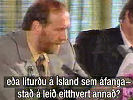 Fischer to get refuge in Iceland? Fischer to get refuge in Iceland?12/16/2004 The news today on Bobby Fischer, who is currently being held in a Japanese detention facilities pending extradition to the US, is that the Icelandic government has offered to grant him a residence permit. In a telephone interview Fischer speaks about his plight in Japan and reacts to statements by Garry Kasparov on Fischer Random Chess. Full details... |
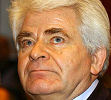 Returning to the 'scene of the crime' Returning to the 'scene of the crime'30.11.2004 Twelve years ago Boris Spassky played a match against Bobby Fischer in Yugoslavia. That got Fischer into a lot of trouble, while for Spassky, a French citizen, there were no repercussions. Now the tenth world champion returned to Belgrade to open the Belgrade Chess Trophy. Quick interview... |
 Fischer to Bush and Koizumi: 'You are going to pay for this!' Fischer to Bush and Koizumi: 'You are going to pay for this!'18.10.2004 Bobby Fischer, still in detention in Japan, has spoken out again in an interview, this time threatening the Japanese Prime Minister Koizumi and US President Bush: "You are going to pay for this, and you are going to pay for your crimes in Iraq too." His new lawyer, Richard J. Vattuone, plans to release documents to prove US government involvement in a plot against Fischer. |
 'We want to live together forever' 'We want to live together forever'01.09.2004 She collected pictures of her chess hero after his match with Boris Spassky in 1972. One year later they met in Tokyo – the start of a romance spanning decades. Since four years the two have lived together in downtown Kamata in Tokyo's Ota Ward. In an exclusive interview for ChessBase Miyoko Watai tells us the story of her life with Bobby Fischer. |
 Listen to Bobby Fischer Listen to Bobby Fischer26.08.2004 In emotional phone calls from his detention cell in Tokyo ex world champion Bobby Fischer gave a Philippine radio station two lengthy interviews. Fischer is facing deportation and incarceration in the US, and voices his nightmare fears: "I will be tried, convicted, sentenced, imprisoned, tortured and murdered." We have summary transcripts and audio files. |
 Dramatic moments around Fischer's deportation Dramatic moments around Fischer's deportation25.08.2004 First the Japanese Justice Minister Daizo Nozawa issued a deportation order against former world champion Bobby Fischer's, then Fischer's lawyers filed a lightning appeal on the grounds that physical deportation would be a flagrant violation of Fischer's right to full legal recourse and protection under Japanese law. Here's the full story by Fischer's legal coordinator. |
 'Bobby Fischer and I have decided to marry' 'Bobby Fischer and I have decided to marry'17.08.2004 Bobby Fischer, the former world chess champion, plans to marry the president of the Japan Chess Association (and four-time Japanese women's champion) Miyoko Watai. This was reported in newspapers and wire services last night. Now Watai-san has sent us a statement explaining the background of her personal relationship with Fischer. |
 Fischer renounces US citizenship Fischer renounces US citizenship15.08.2004 Bobby Fischer has been moved to a new detention facility in Tokyo, pending a decision on his deportation to the US, where he faces a 10-year jail sentence. A lot of new material has surfaced, including Fischer's handwritten renouncement of his US citizenship and a blow-by-blow description and picture of his arrest at Narita Airport. Harrowing stuff... |
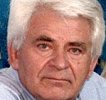 Spassky to Bush: Arrest me! Spassky to Bush: Arrest me!10.08.2004 Boris Spassky, who played the contentious return match against Bobby Fischer in Yugoslavia 1992, for which the latter is currently facing deportation and incarceration in the US, has appealed to President Bush to show mercy and charity for his tormented successor. If for some reason that should be impossible, Spassky suggests a very imaginative alternative... |
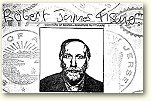 Fischer's appeal rejected Fischer's appeal rejected28.07.2004 Bobby Fischer's appeal against his deportation was rejected today by Japanese authorities. Meanwhile the Icelandic Chess Federation has appealed to US president Bush to pardon Fischer and set up a petition web site to collect signatures. In Tokyo a "Free Fischer Press Conference" is scheduled for Thursday. More... |
 Fischer a sacrificial pawn? Fischer a sacrificial pawn?25.07.2004 Bobby Fischer is still in detention at Narita Airport in Tokyo, traumatised but stubborn, "behaving like a Samurai". At the same time news outlets all over the world are covering the story, with Fischer's brother-in-law Russell Targ assailing the Bush administration for playing election year politics with the former chess champion's freedom. There's a lot to be read... |
 Game of Life: Kasparov on Fischer - in full Game of Life: Kasparov on Fischer - in full20.07.2004 The news of Fischer's arrest in Japan came as a shock to Garry Kasparov, who was in a holiday camp working intensely on the games of his greatest American predecessor. In today's issue of The Wall Street Journal Kasparov assesses Fischer's chess career – for a public that was being exposed to his current situation. We now bring you Kasparov's full article. |
 Will Fischer be extradited? Will Fischer be extradited?19.07.2004 Chess legend Bobby Fischer, the hero of millions, languishes in the detention facilities of Narita Airport in Tokyo, waiting for a decision by Japanese Immigration authorities on his deportation to the US. We have collected all the documents and reconstructed a timeline to his arrest. Fischer, who has no legal counsel, is appealing for international assistance. |
 Bobby Fischer detained in Japan (updated) Bobby Fischer detained in Japan (updated)16.07.2004 It's the latest twist in the sad tale of American former world champion Bobby Fischer. He has been detained in Japan and faces possible deportation to the US to face charges for playing in Yugoslavia in 1992. Fischer's website says he was "very nearly killed" in Japan. The story has been picked up by news services all over the world. |